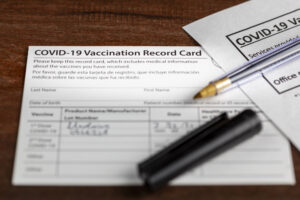

At Payroll Medics, Covid-19 compliance has been a topic of conversation with other business leaders. We wanted to answer two of the most asked questions.
Can a business require employees to show proof they are vaccinated against Covid-19?
and
If the employee is not vaccinated or refuses to show proof of vaccination can the business legally require those employees who are not vaccinated or refuses to show proof of vaccination to wear a mask inside the business?
Let’s start by answering – Can a business require employees to show proof they are vaccinated against Covid-19?
Within the guidelines set forth by the federal Equal Employment Opportunity Commission (EEOC), employers are not prohibited from asking applicants and employees whether they have received the COVID-19 vaccine and if they have, can also request receipts of such vaccinations.
Note: documentation or other confirmation of vaccination provided by the employee to the employer is medical information about the employee and must be kept confidential.
Thus, an employer can ask about COVID-19 vaccination statuses and for proof of the same if employees or applicants indicate they are so vaccinated. To the extent the employer will seek to make inquiry about COVID-19 vaccination status, it should do so individually and not in a group setting and make such inquiry of all employees and/or applicants and not just some without others.
The employer has an obligation to ensure that those asking the questions and receiving the answers do so in a manner that maintains confidentiality as required by law.
The ADA requires an employer to maintain the confidentiality of employee medical information, such as documentation or other confirmation of COVID-19 vaccination. This ADA confidentiality requirement applies regardless of where the employee gets the vaccination. Although the EEO laws themselves do not prevent employers from requiring employees to bring in documentation or other confirmation of vaccination, this information, like all medical information, must be kept confidential and stored separately from the employee’s personnel files under the ADA.
The EEOC also supports employers that seek to require employees to be vaccinated as a condition of employment, so long as employers provide reasonable accommodations under Title VII of the Civil Rights Act of 1964 and the Americans with Disabilities Act (ADA) based on any one or more employees’ sincerely held religious beliefs or disability, respectively.

Now let’s answer the second question, If the employee is not vaccinated or refuses to show proof of vaccination can the business legally require those employees who are not vaccinated or refuses to show proof of vaccination to wear a mask inside the business?
When deciding to mask or not to mask, communication is key. While there’s a lot of confusion out there about what states are doing, there shouldn’t be a lot of confusion about what employers are doing. Employers should set clear policies and make employees aware of what disciplinary action could be taken if masks are not properly worn.
But employers should have a conversation with employees before taking disciplinary action. It is advisable for employers to explore reasonable accommodations if employees object to wearing a mask because of a medical condition or other legally protected reason.
Additionally, mask use may create or exacerbate hazards for some workers, including those that handle chemicals or perform strenuous activities outdoors in the heat. OSHA recommends that employers explore alternatives for those workers, such as face shields and respirators.
However, a few experts do caution against lifting restrictions based on general objections to mask wearing. Employers may be setting themselves up for a lawsuit if someone gets ill from COVID-19, so it’s better to be ready to explain why you made the decision to enforce a mask policy, particularly in light of OSHA and CDC guidance.
Employee communication is key. Be clear and transparent with employees when you announce whatever changes and policies are being made.